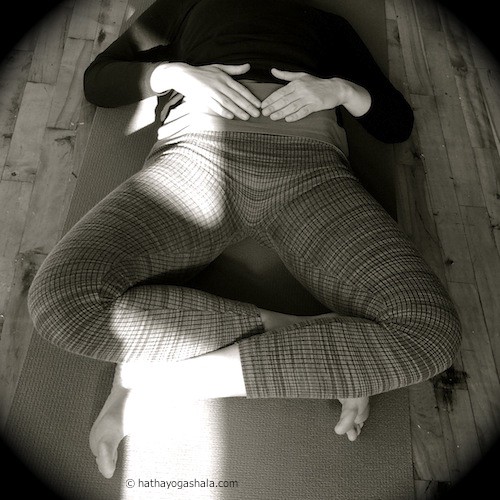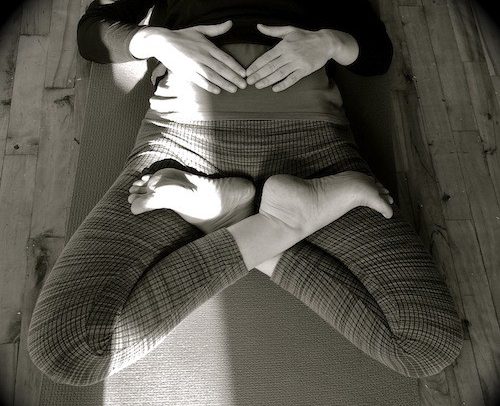Sleep
One of the effects of a yoga practice is the natural reduction in required hours of sleep. We just don’t need as much, we get less fatigued and are faced with more hours in the day to use at will. Not requiring an abundance of hours of sleep and not being able to sleep are very different. One leaves you fresh, alert and rejuvenated. The other leaves you depleted, anxious and frazzled.
How we live our lives and what constitution we have will determine how many hours we need. Each person must discover this for themselves.
If you notice you are always tired it could be that you are working too hard or it could be that you are actually sleeping too much! Explore and take note of your energy levels when adjusting the alarm clock from time to time. Often students will be highly resistant to attending early morning classes, their excuse is I am not a morning person, no way you’ll get me in before 10am. However more often than not, once they submit to the 7am class for a week, they find they have more energy to get them through their day.
So how is it that by getting less sleep we have more energy? You’ll have to try it out for yourself and see.
Not being able to sleep is something else and can lead to problems of the opposite kind. We do not feel refreshed, rested or alert, rather we are unable to focus, feel dizzy, our nerves are fried and we are irritable. Relentless thoughts push stress up like insurmountable waves of emotion and mental flurry. Stress goes up, into the neck, shoulders and head. Depending on the level of circumstances it can be like a fire that cannot be contained, blazing upward. We lack grounding and our breath is up in our chest. Over-thinking, over-doing, over-controlling, over-stimulating, over-eating can all cause the mind and body to become over-active and restless. The Yang, whose nature is to rise, is unable to go into hibernation at night when it is supposed to. Insomnia is a disharmony between our ability to be awake and active and our ability to restore.
Before reaching for the sleeping pill, see if you have tried any of the following:
- Reduce or eliminate caffeine. Tea, coffee, chocolate, energy drinks, although offering a temporary creative boost, in the long term caffeine is said to dehydrate, deplete and alter hormones. My constitution does not tolerate caffeine very well. I experience these side effects quite clearly whenever I do decide to indulge. But if you can’t go without, be sure to ingest in the morning only.
- Avoid eating a few hours before going to bed. When eating eat, when sleeping sleep. Offer the body no other task to do when placing your head down so it doesn’t have to spend the energy digesting food instead. Even better is to eat the largest meal earlier in the day and keep dinners very light.
- Avoid working or being online an hour before going to bed. Stimulating movies and thought involved tasks excite the mind. Unwinding before settling in for the night helps ensure a peaceful rest.
- Get to bed by 9:30 pm. According to Chinese medicine, each night Yang has its proper time to descend into Yin and must go into hibernation in order to restore. According to Ayurveda, the Pitta time between 10pm and 2am is when one should sleep in order to digest each day’s events. The natural deep sleeper is heavy Kapha (earth and water) from 6pm — 10pm. At 10pm it transfers over to Pitta (fire and water) which means, if we don’t fall asleep before 10pm, we can get that ‘second wind’ and be up all night as Fire naturally rises.
If you’ve tried everything, then perhaps there is an underlying problem with an organ system. According to Chinese Medicine, each organ has an active time of day. In its peak hour it can show signs of strength or excess. In its opposite hour, it may show signs of weakness or deficiency.
An example is the Heart whose peak time is 11am — 1pm. It’s vessels are dilated and heat is high so any overexertion or intense exercise at this time would cause undue strain on the heart. Its opposite hour at 11pm — 1am is its weakest time, vessels are more constricted. It’s common for those with weak hearts to suffer heart attacks in the middle of the night during those very hours.

In times of stress when the mind can’t seem to settle down and go to sleep, try doing SUPTA PADMASANA in bed. If you are unable to do full Padmasana, do 1/2 Padmasana or simply cross your shins and place your palms on your belly. You may notice that it quickly reduces the mental activity and pulls the mind into the body’s centre. Placing pressure on the shins sucks the rising energy downwards and gives a sense of grounding. This position drags the breath into the abdomen, reduces anxiety and lowers the respiration rate allowing you to ease into a calmer more restful state. Stay as long as needed, alternate legs and hopefully it will help you eventually doze off. Be sure to come out or adjust if uncomfortable.
So get yourself to an early morning yoga class and see how it can change your daily levels of energy. It may also help improve your sleep by getting you to bed earlier!
Wishing you a restful night!
Radhasri (Rhonda Fogel) has been teaching yoga in Canada since 1998 and is the founder of Hatha Yoga Shala currently based in Montreal.
